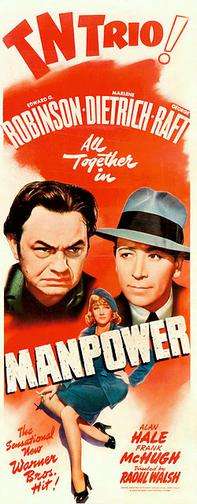Manpower (1941 film)
Manpower is a 1941 film noir directed by Raoul Walsh and starring Edward G. Robinson, Marlene Dietrich, and George Raft. The picture was written by Richard Macauley and Jerry Wald, and the supporting cast features Alan Hale, Frank McHugh, Eve Arden, Barton MacLane, Ward Bond, and Walter Catlett.
| Manpower | |
|---|---|
 Theatrical release poster | |
| Directed by | Raoul Walsh |
| Produced by | Hal B. Wallis Mark Hellinger |
| Written by | Richard Macauley Jerry Wald |
| Starring | Edward G. Robinson Marlene Dietrich George Raft |
| Music by | Adolph Deutsch |
| Cinematography | Ernest Haller |
| Edited by | Ralph Dawson |
| Distributed by | Warner Bros. Pictures |
Release date |
|
Running time | 103 minutes |
| Country | United States |
| Language | English |
| Budget | $918,000[1] |
| Box office | $1,842,000[1] |
Robinson and Raft got into a fistfight on the set that was eagerly splashed all over the front pages of the nation's newspapers. Victor McLaglen was originally going to play Robinson's role, which would have made it a supporting part, and Raft reportedly resented sharing leading man status on the film as a result of Robinson being cast instead.[2]
Raft chose Manpower over the remake of the 1931 pre-Code version of Dashiell Hammett's The Maltese Falcon, and the career-catapulting role of Sam Spade went to Humphrey Bogart instead.
The script is one of many reworkings of the plotline for a 1932 Robinson movie called Tiger Shark, in which Robinson played essentially the same part, only as a tuna fisherman rather than an electric power lineman.
Plot
A leg injury causes Los Angeles power line worker Hank McHenry to give up field work and accept a promotion to foreman. His crew includes good friend Johnny Marshall and old Pop Duval.
Pop is killed during an ice storm. His daughter Fay's seeming indifference to the death irritates Johnny, but Hank is attracted to her. A hostess in a nightclub, Fay accepts money from Hank and also his marriage proposal, even though she does not love him.
Before a project that takes them to Boulder Dam, an injury befalls Johnny. He is taken into Hank's home to recuperate where, after a month together, Fay tells him she is attracted to him but Johnny resists her. Fay decides to leave Hank, but she is arrested in a raid while she is visiting her old club. Johnny pays her bail and stops her leaving Hank. However, she tells Hank that she is leaving him and is attracted to Johnny and a combination of circumstances means that Hank misconstrues the situation, believing Johnny has betrayed him.
In wet and windy weather, Hank climbs a pylon with his bad leg to attack Johnny, during which Hank falls to his death. Johnny is left to decide whether he is attracted to Fay or repelled by her.
Cast
- Edward G. Robinson as Hank "Gimpy" McHenry
- Marlene Dietrich as Fay Duval
- George Raft as Johnny Marshall
- Alan Hale, Sr. as Jumbo Wells
- Frank McHugh as Omaha
- Eve Arden as Dolly
- Barton MacLane as Smiley Quinn
- Ward Bond as Eddie Adams
- Walter Catlett as Sidney Whipple
- Joyce Compton as Scarlett
- Lucia Carroll as Flo
- Egon Brecher as Pop Duval
- Cliff Clark as Cully
- Joseph Crehan as Sweeney
- Ben Welden as Al Hurst
- Barbara Pepper as Polly
- Dorothy Appleby as Wilma
Production
Mark Hellinger was meant to produce the film, but had a falling out with Hal Wallis of Warner Bros.[3]
Walsh was keen to make the film because he was getting a reputation as a "Man's" director and Marlene Dietrich had a lead role.[4]
Production was marked by several conflicts between Raft and Robinson, mostly initiated by Raft. Robinson recalled Raft as "touchy, difficult and thoroughly impossible to play with."[5]
Raft verbally abused Robinson and pushed him around the set. Raft later complained that Robinson tried to tell him how to act; he also felt the actor was miscast, preferring Victor McLaglen.[6] Raft resented having to accept third billing despite having the largest role in the film by a wide margin. Robinson and Raft appeared together again 14 years later for a film noir entitled A Bullet for Joey (1955), after both their careers had seriously declined.
Reception
Bosley Crowther wrote a positive review for the film, noting that the cast was outstanding: "With such exceptional material, the Warner blacksmiths couldn't help but make good—good, in this sense—meaning the accomplishment of a tough, fast, exciting adventure film."[7] Channel 4's review of the movie notes the exciting setting makes it worth seeing, but goes on to pan the film: "Directed with the usual efficiency by Walsh, Manpower's weak script never manages to convince despite the setting and the strong cast."[8]
The film was a solid box office hit.[6] According to Warner Bros records, it earned $1,180,000 domestically and $662,000 foreign.[1]
References
- Warner Bros financial information in The William Shaefer Ledger. See Appendix 1, Historical Journal of Film, Radio and Television, (1995) 15:sup1, 1-31 p 20 DOI: 10.1080/01439689508604551
- Vagg, Stephen (February 9, 2020). "Why Stars Stop Being Stars: George Raft". Filmink.
- Patricia Morison Is Suspended for Her Refusal to Enact Role in 'Singin' Hills' New York Times 10 Mar 1941: 21.
- Walsh, Raoul (1974). Each man in his time; the life story of a director. Farrar, Straus and Giroux. p. 364.
- Robinson, Edward G.; Spigelglass, Leonard (1973). All my yesterdays; an autobiography. Hawthorn Books. p. 244–245.
- Everett Aaker, The Films of George Raft, McFarland & Company, 2013, pp. 96-97
- New York Times review
- Channel 4 review